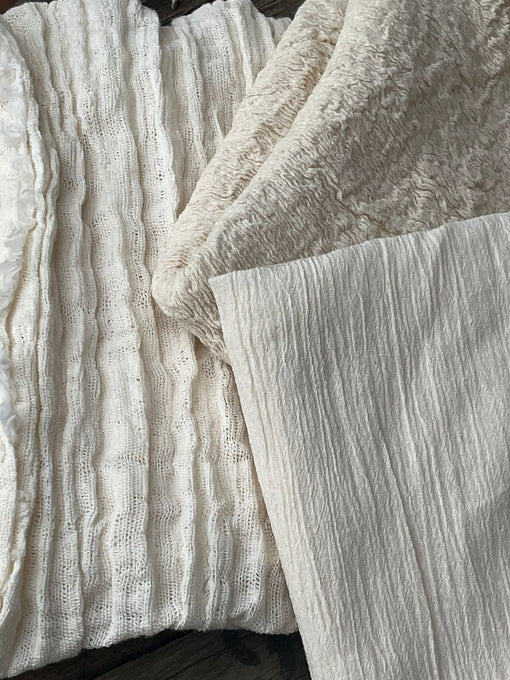
- Article published at:
- Article author: Yasemen İnan
- Article tag: Anatolian textiles
- Article comments count: 0
Drawer menu
 Moiré Kutnu vs. Moiré Fabric: A Tale of Two Textiles
Moiré Kutnu vs. Moiré Fabric: A Tale of Two TextilesAt Anatolian Textures, we celebrate fabrics that tell stories of both tradition and craftsmanship. Among these, Moiré Kutnu stands out as a shimmering textile rooted in Gaziantep, Turkey, where it has been handwoven for centuries. But how does it differ from the Moiré fabrics widely sold in Europe and America?
Both share the same rippling, water-like pattern known as the moiré effect, but they differ greatly in origin, material composition, and quality.
Origin: Produced exclusively in Gaziantep, Moiré Kutnu is a traditional type of Kutnu fabric.
Material Composition: Always woven from a 50% silk and 50% cotton blend. This natural fiber mix gives it both softness and durability.
Craftsmanship: Entirely handwoven using Anatolian techniques passed down for generations.
Moiré Effect: Achieved by pressing the fabric to create a shimmering, marbled surface pattern that enhances the vibrant woven designs.
Character: Each piece is unique—rich in color, pattern, and heritage. Historically worn by Ottoman elites, it continues to be admired as a luxury fabric with cultural depth.
Origin: Moiré fabric as a general term has long been used in European and American textile industries, especially in fashion and upholstery.
Material Composition: Unlike Moiré Kutnu, these fabrics are often made with synthetic fibers (such as polyester or rayon), though sometimes silk or cotton versions exist.
Production: Usually created in large-scale mills with machine processing, prioritizing appearance over heritage.
Use: Popular for evening gowns, bridal wear, upholstery, and decorative applications where the shimmering moiré effect is desired.
| Feature | Moiré Kutnu | Moiré Fabric (Western) |
|---|---|---|
| Origin | Gaziantep, Turkey | Europe & America |
| Material | 50% silk, 50% cotton | Often synthetic blends (polyester, rayon), sometimes silk |
| Craftsmanship | Handwoven, traditional Anatolian heritage | Machine-made, industrial |
| Design | Geometric patterns + moiré effect | Shiny surface with moiré effect only |
| Value | Cultural, artisanal, authentic | Commercial, decorative |
 Why Moiré Kutnu is Unique
Why Moiré Kutnu is UniqueWhile both fabrics share the moiré pattern, Moiré Kutnu is rooted in authenticity and tradition. Made from pure silk and cotton and handwoven in Gaziantep, it reflects the artistry of Anatolian craftsmen. By contrast, much of the moiré fabric available in Western markets today relies on synthetic fibers, focusing on mass production rather than heritage.
At Anatolian Textures, we believe Moiré Kutnu is not just a fabric—it is a piece of living history, combining natural luxury with centuries-old craftsmanship.